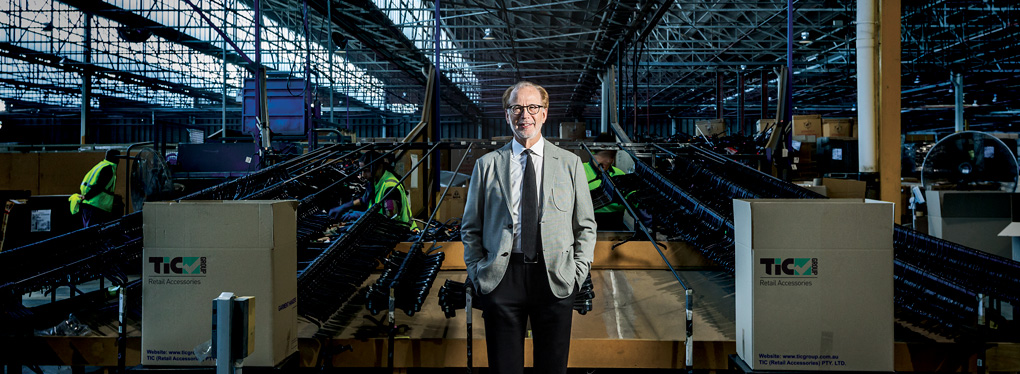Co-Director of Victoria-headquartered TIC Group David Harris shares the story of the company’s journey into the world of reuse, resource recovery and sustainable solutions.
In a western suburb of Melbourne, midway down a long road interposed with residential and commercial properties, is an unremarkable, single- storey office with a warehouse behind it. The premises could be tagged “the TIC Group Tardis”, as the frontage belies the size of buildings, which in turn disguises the breadth of the business.
After starting out life in garment hanger reuse, TIC Group now has 1,500 employees in 15 locations across the world, including 500 in Melbourne and Sydney. It has brought several world-firsts to market, including automated technology to process hangers efficiently, and Solvup, a software that improves the customer post-sales experience around returns.
Despite its size and contribution to the sustainability agendas of many prominent Australian retailers, TIC Group has only appeared on the radar of the waste management and recycling industry in the past 18 months due to its high profile venture into mattress recycling. Its Australia-first automated mattress deconstruction plant near Melbourne was due to be formally opened on 14 October. A second is being built in Sydney to be commissioned in early 2017.
Its business areas have two things in common – client-focused ideas and diverting products and materials from landfill. Indeed, its tagline is “innovation in mind and sustainability at heart”.
Entrepreneurial spirit
TIC Group – short for The Ideas Company – was founded by Directors David Harris and Mark Gandur in 1989.
It now has more than 27 years’ experience of pioneering innovative environmentally-led solutions for national and global retailers – its name clearly indicative of “doing what it says on the packet”.
The idea of running a globally successful business was miles away from David’s start in life. He was born into a working class family in the English footballing city of Manchester – remaining a staunch supporter of City, not United – and emigrated to Australia with his family in the 1960s. Naturally ambitious and smart, on leaving school he joined a bank.
“I found out that they would allow younger employees time off to study at university,” says David. “So I joined a bank as a teller, got my degree in accounting and economics, and eventually worked as an accountant.”
After four years in accountancy, in the 1980s David joined hosiery and underwear manufacturer Kortex, progressing to managing director and part-owner. In 1987, after the business was sold, he was looking for a new business to invest in.
It was then that David’s partnership with Mark took root.
They joined forces, and their hunt for a business venture led to one door closed, which revealed another stretched wide open.
“We tried to buy a garment hanger business because my previous company had always had trouble with hangers,” David recalls. “We travelled interstate to look at one for sale. It didn’t work out, but on the flight back we started speculating about what happened to all the hangers out there already.”
David and Mark learnt that Australia was at that time switching over to a concept called “floor ready merchandise”. This meant that garments came into stores on the hanger and fitted with security tag, ready to go on display immediately, which saved time and money.
“We then discovered that most customers didn’t want their hangers when asked at the cash register, so they went in the bin and then to landfill. That started us thinking about what could be done with them.”
David and Mark then approached the Managing Director at Kmart with an idea to collect and reuse the hangers. They were initially given one store at which to test the concept. The hangers were brought into one of their premises, they timed how long it would take to sort them manually and then planned how to make a reuse business commercially viable. They figured how to make it work.
Following further trials, in 1989 TIC Group got the first ever contract for garment hanger reuse with Kmart Australia. As the majority of garments were made in Australia, Kmart then informed its merchants how to buy its approved, reclaimed hangers from TIC.
To protect the sorting and reuse idea, TIC quickly built the world’s first hanger sortation machine. Costing over $1 million, the high-tech processor photographed every hanger and grouped them according to factors such as size and type.
To read more, see page 14 of Issue 8.



